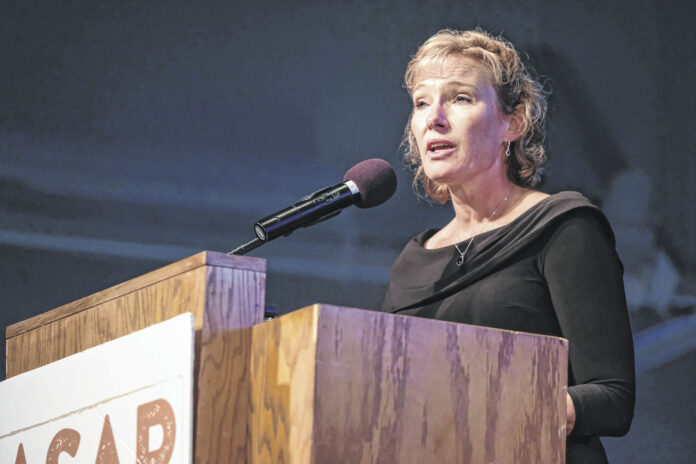
Several individuals and organizations are working to initiate a proposed pilot project intended to provide a brighter future for at-risk children and their families.
One factor for the “Youth and Family Community Connections” proposal is the percentage of Bartholomew County youth involved in the local juvenile justice system, especially girls, who report suicidal thoughts, county officials said.
The level of “suicidal ideation” locally has been consistently high for 13 years, Bartholomew County Assistant Chief Probation Officer for Juvenile Services Nichole Phillips said. According to the definition of “suicidal ideation”, ideas of killing oneself might range from fleeting thoughts to a complete preoccupation with self-destruction.
Phillips says she bases her conclusions on results from the Massachusetts Youth Screening Instrument (MAYSI-2), a behavioral health screening tool designed especially for juvenile justice programs and facilities involving children from 12 to 17 years old.
Another concern is that 75% of the youth involved in Bartholomew County’s juvenile justice system are considered at moderate to high risk for suffering mental health issues or becoming involved in substance abuse, Phillips said. Three of the greatest needs for at-risk juveniles in Bartholomew County pertain to mental health, substance abuse and family relations, according to a project outline.
“If these youth do not receive services early on, they become a higher risk for entering the juvenile justice system,” Phillips said.
Young people either have to get into legal trouble or become involved with the Department of Child Services before they can gain access to intensive, home-based services, Bartholomew Circuit Court Judge Kelly Benjamin said.
After considering alternatives to juvenile detention, Benjamin said efforts began a few years ago to find ways of helping children secure a brighter future and stay on the right side of the law. As a result, the judge says two initial guiding questions emerged:
How can our community treat the whole child, rather than the symptoms?
How can we build inclusive experiences for children with problems and disabilities, so they thrive in our society?
Benjamin said she found inspiration after observing how the Alliance for Substance Abuse Progress (ASAP) Hub came together, as well as how much the ASAP Hub has benefited the entire community, the judge said.
“It got me to wonder why we aren’t doing that with juveniles,” Benjamin said. “Why are we waiting until they are in our (juvenile justice) system before we get that same type of process going, get it up front and start switching things around to where it makes sense?”
With the assistance and collaboration of several community experts and organizations, the Youth and Family Community Connections pilot program began to be formulated. Still in its early stages, this preventive support services program would also have a Hub serving as a single point of assessment, Phillips said.
Each individual would be individually analyzed so effective steps could be taken to building skills that protect against risky behaviors, Phillips said. The program is intended to young people contributing positively to the community and ultimately thrive in adulthood, she said.
“With this program, we work with whole families — not just youth,” Benjamin said.
If approved, this new Hub would likely be housed at the Youth Services Center, 2350 Illinois St., in an area apart from young detainees. In addition, the judge said she would also like to establish satellite locations in outlying neighborhoods.
Community coaches or system navigators would strive to assure children would receive the same connections and supports no matter where they live or their individual circumstances, Phillips said.
The program will require that individual-based judgments be made regarding relevance, effectiveness, efficiency, impact and sustainability, Phillips said.
Youth and Family Community Connections would combine existing community youth and family supports, as well as allow the creation of new supports, Phillips said. When necessary, it would also provide trauma-responsive services, a program outline states.
Assisting in the pilot program will be several organizations involved in health care, mental health services, education and housing to ensure strategies focus on all relevant issues, Phillips said.
Some of these organizations have already provided valuable information for the pilot program such as juvenile justice data, child welfare data, substance abuse, mental health risk levels, student homelessness, depression and parent incarceration data.
Examples of connections and supports include social service referrals, coordinated entry into services, and school connections for youth transitioning to a different education environment, she said.
“We would partner with all agencies that are already providing prevention services to make sure youth are connected with the right service — even without the juvenile justice involvement,” Phillips said.
The proposal has been presented to multiple community boards and organizations over the past few months. According to a program outline, the positive feedback received from every organization has been encouraging.
In order to help secure resources to prevention services, law enforcement would be encouraged to refrain from bringing children into the juvenile justice system for what Phillips calls “status offenses.” They include truancy, curfew violations, underage drinking and running away from home.
Roughly half of all children in juvenile detention are admitted due to status offenses, which Phillips and Benjamin say should be handled by parents. Of all the referrals received, no action is taken on 60% to 65% on them, Phillips said.
“They shouldn’t be in the juvenile justice system, but they’ve risen to a level where parents are calling police to assist, and they are brought to our attention,” Phillips said. “We would like this to this stop before it is brought to our attention.”
The Youth and Family Community Connections program has not received final approval, and will take some time to set up. One or two new employees will be needed for Phase One, which will take place from three to five years, the judge said.
At this time, a team is working on the structure of the Community Connections Hub, Benjamin said. Once the structure is completed, the next step will be designing the program, she said. There is also a team looking into ways to finance the program, the judge added.
“As we work through the process, we will invite individuals and agencies that address specific needs of population in our community to make sure we are providing an equitable approach,’ Phillips said.




